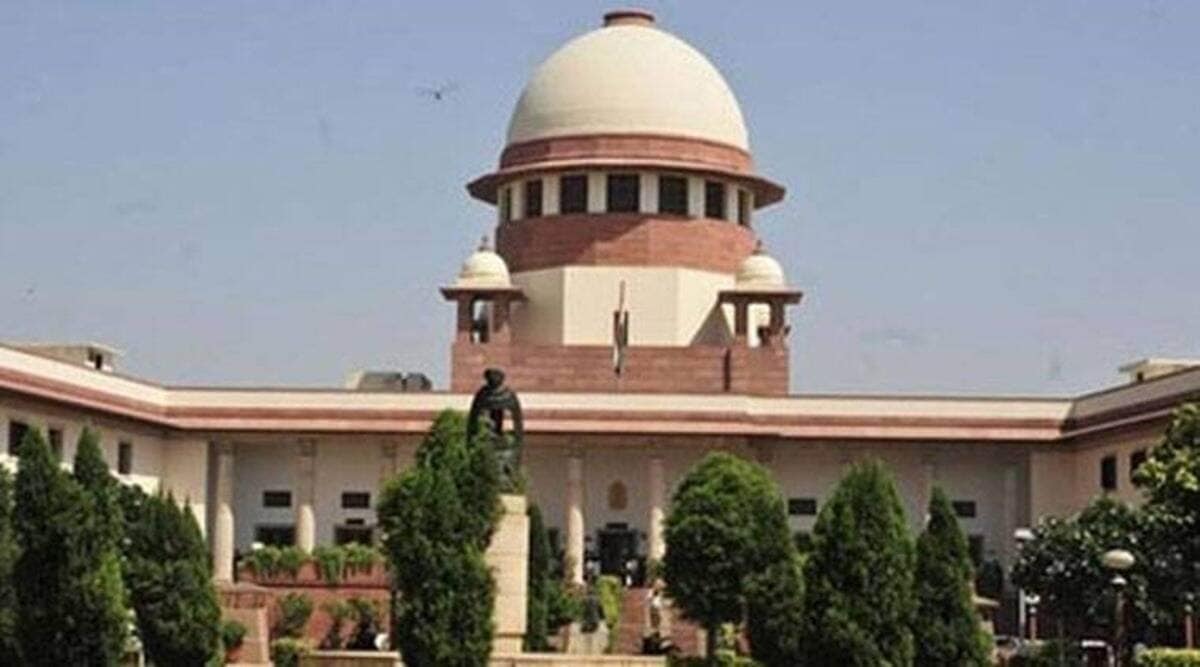Underlining that “the principle of innocence of the accused/offender is regarded as a human right” but “that presumption can be interdicted by a law made by the Parliament/Legislature”, the Supreme Court Wednesday upheld the constitutional validity of the Prevention of Money Laundering Act, 2002, as amended from time to time including those dealing with the powers of the Enforcement Directorate (ED) regarding arrest, search, attachment and seizure in money laundering offences.
The Centre had told the Court that “it cannot be said that presumption of innocence is a constitutional guarantee”.

The Court also said an Enforcement Case Information Report (ECIR) cannot be equated with an FIR, that supplying an ECIR in every case to the person concerned is not mandatory and “it is enough if ED, at the time of arrest, discloses the grounds of such arrest”.
Ruling on a batch of 242 petitions that raised questions on different provisions of the PMLA including Section 3 which defines what constitutes money laundering, a three-judge bench of Justices A M Khanwilkar, Dinesh Maheshwari and C T Ravikumar, while upholding the provisions, left the question whether some of the amendments could have been brought by way of Finance Acts, to a seven-judge bench which is already seized of a similar question in the matter of some other legislations.
The bench refused to accept the contention that the procedure followed by the ED in registering an ECIR is opaque, arbitrary and violative of the constitutional rights of an accused and that the procedure followed under PMLA is draconian since it violates the basic tenets of the criminal justice system and the rights enshrined in Part III of the Constitution of India, in particular Articles 14, 20 and 21.
Rejecting the argument of the petitioners that it will amount to an offence of money laundering only if the proceeds of crime are projected as untainted property, the bench said, “Section 3 of the 2002 Act has a wider reach and captures every process and activity, direct or indirect, in dealing with the proceeds of crime and is not limited to the happening of the final act of integration of tainted property in the formal economy.”
It said that “from the bare language of Section 3 of the 2002 Act, it is amply clear that the offence of money laundering is an independent offence regarding the process or activity connected with the proceeds of crime which had been derived or obtained as a result of criminal activity relating to or in relation to a scheduled offence. The process or activity can be in any form — be it one of concealment, possession, acquisition, use of proceeds of crime as much as projecting it as untainted property or claiming it to be so. Thus, involvement in any one of such processes or activity connected with the proceeds of crime would constitute offence of money laundering”.
Story continues below this ad
The ruling, however, made it clear that the offence under Section 3 “is dependent on illegal gain of property as a result of criminal activity relating to a scheduled offence” and as such, “the Authorities under the 2002 Act cannot prosecute any person on notional basis or on the assumption that a scheduled offence has been committed, unless it is so registered with the jurisdictional police and/or pending enquiry/trial including by way of criminal complaint before the competent forum”.
It said “if the person is finally discharged/acquitted of the scheduled offence or the criminal case against him is quashed by the Court of competent jurisdiction, there can be no offence of money laundering against him or any one claiming such property being the property linked to stated scheduled offence through him”.
The bench upheld the ED’s power under Section 5 of the Act to order provisional attachment of any proceeds of crime, saying “it provides for a balancing arrangement to secure the interests of the person as also ensures that the proceeds of crime remain available to be dealt with in the manner provided by the 2002 Act”. There are enough procedural safeguards, it said, to protect the interests of the person concerned.
It approved the validity of Section 24 which puts the onus on the accused to prove that the proceeds of crime are untainted property. The judgment said this “has reasonable nexus with the purposes and objects sought to be achieved by the 2002 Act and cannot be regarded as manifestly arbitrary or unconstitutional”.
Story continues below this ad
It rejected the argument that ED authorities are police officers and, hence, a statement recorded by them under Section 50 of the Act would be hit by Article 20(3) of the Constitution which says no person accused of an offence shall be compelled to be a witness against himself.
It said “the purposes and objects of the 2002 Act for which it has been enacted, is not limited to punishment for offence of money laundering, but also to provide measures for prevention of money laundering. It is also to provide for attachment of proceeds of crime, which are likely to be concealed, transferred or dealt with in any manner which may result in frustrating any proceeding relating to confiscation of such proceeds under the 2002 Act. This Act is also to compel the banking companies, financial institutions and intermediaries to maintain records of the transactions, to furnish information of such transactions within the prescribed time in terms of Chapter IV of the 2002 Act. Considering the above, it is unfathomable as to how the authorities referred to in” the Act “can be described as police officers”.
“It must follow that the authorities under the 2002 Act are not Police Officers. Ex consequenti, the statements recorded by authorities under the 2002 Act, of persons involved in the commission of the offence of money laundering or the witnesses for the purposes of inquiry/investigation, cannot be hit by the vice of Article 20(3) of the Constitution or for that matter, Article 21 being procedure established by law,” it said.
The judgment upheld the twin conditions for bail in Section 45 of the Act. These were struck down by the Supreme Court in 2017 but revived by Parliament by way of an amendment. Ratifying this, the bench said “it was open to the Parliament to cure the defect noted by this Court so as to revive the same provision in the existing form”.
Story continues below this ad
The bench held that in view of the special mechanism envisaged by the 2002 Act, an ECIR cannot be equated with an FIR under the Code of Criminal Procedure, 1973. The ECIR is an internal document of the ED and the fact that FIR in respect of scheduled offence has not been recorded does not come in the way of ED authorities to commence inquiry/investigation for initiating “civil action” of “provisional attachment” of property being proceeds of crime, it said.
The bench said that supply of a copy of ECIR in every case to the person concerned is not mandatory and “it is enough if ED at the time of arrest, discloses the grounds of such arrest.
It held that Section 63 of the Act, providing for punishment regarding false information or failure to give information, does not suffer from any vice of arbitrariness.
The bench, however, said that the petitioners are justified in expressing serious concern owing to vacancies in the Appellate Tribunal under the Act and asked the government to take corrective measures in this regard expeditiously.









